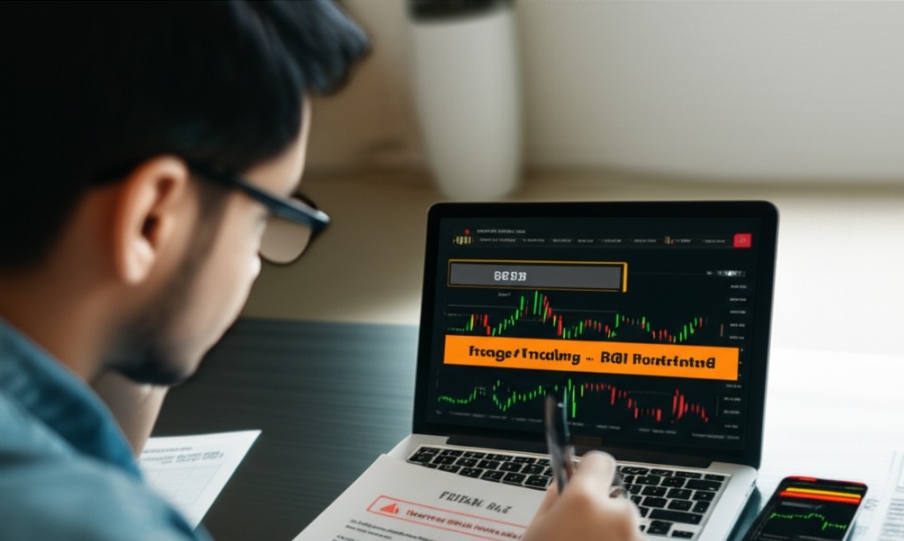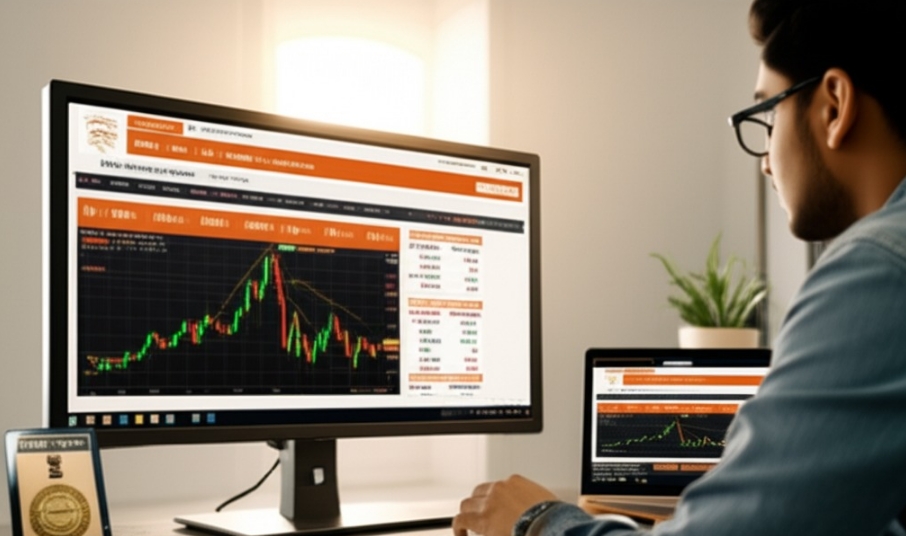Table of contents
"Why is Forex Trading Illegal in India?" — this is the question that stumps a lot of folks trying to earn a bit extra on the side. You hear stories of someone making a quick buck trading currencies online, and next thing you know, a curious Google search leads you into a maze of terms like RBI guidelines, FEMA Act, and offshore platforms. Most people don’t realize that trading forex the wrong way here can get you into serious legal soup.

The Reserve Bank of India has made it crystal clear: trading foreign currencies outside its approved channels is a big no-no. As RBI puts it, “Remittance in any form for margins or trading in foreign exchange is not permitted.” Still, thousands of desi traders are caught off guard, thinking it’s all fair game if the app looks flashy enough.
So, in this article, we’re laying it all out: why the ban exists, which apps are risky, what legal routes you can take, and how to avoid burning your fingers.
Why Is Forex Trading Illegal in India?
Violation of FEMA Guidelines
The Foreign Exchange Management Act (FEMA) governs all currency-related transactions in India. Under FEMA, trading in foreign exchange is restricted unless done through approved channels and in permitted currency pairs.
Trading with unauthorized brokers or on unregulated platforms directly breaches FEMA, exposing individuals to penalties, including fines and prosecution. These laws are designed to protect the Indian rupee from volatile foreign capital flow.
Unregulated Forex Market Risks
Honestly, diving into the unregulated forex world is like gambling without rules. With no SEBI or RBI oversight, your money is completely at the mercy of shady brokers and manipulated platforms.
There’s zero investor protection, and once your funds go offshore—poof, good luck getting them back. That’s why the government steps in with strict bans: to shield you from getting scammed.
Offshore Broker Legal Conflicts
Most popular forex brokers operate from jurisdictions like Cyprus, Belize, or Seychelles. These brokers may offer high leverage, flashy dashboards, and 24/7 support—but they’re illegal for Indian residents.
The RBI prohibits remittance of funds for margin trading via the LRS (Liberalized Remittance Scheme), making such transactions a legal violation by default.
RBI Forex Trading Restrictions

Currency Pair Limitations by RBI
The Reserve Bank of India (RBI) allows trading only in a limited number of currency pairs, all of which must involve the Indian Rupee. This is to protect the foreign exchange market from high currency volatility and ensure alignment with monetary policy goals.
Only USD/INR, EUR/INR, GBP/INR, and JPY/INR pairs are currently permitted, and trading must take place on authorized platforms like recognized stock exchanges (NSE, BSE).
The RBI’s stance is grounded in:
Exchange Control Regulations
Capital controls to limit exposure
Monitoring of Authorized Dealers
These regulations keep the forex market within strict compliance boundaries and guard against risky international settlements. Straying outside this framework—say by trading EUR/USD on an offshore app—lands a trader squarely in illegal territory.
LRS Restrictions on Forex Use
The Liberalised Remittance Scheme (LRS) allows Indian residents to send up to USD 250,000 per year abroad. But don’t get excited—there’s a catch.
You can’t use LRS funds to trade on foreign forex platforms.
Here's what’s okay:
Education abroad
Medical treatment
Travel expenses
Maintenance of close relatives
But trading in capital account transactions, like buying shares or forex abroad, is a no-go unless it's routed through approved channels. As the RBI puts it:
"LRS is not meant to bypass Indian exchange control laws."
So yeah, if you're trying to use LRS money to flip currency pairs offshore, you’re breaking rules—even if unintentionally. Better to play it safe and stick to RBI-compliant platforms.
Is Forex Trading Always Illegal in India?
Permitted Currency Pairs in India
Currency trading is only legal in India if it involves specific currency pairs approved by the Reserve Bank of India (RBI) and traded through Authorized Dealer Category-I banks. These currency pairs are always quoted against the Indian Rupee (INR):
| Permitted Currency Pairs | Currency Code | Region |
|---|---|---|
| US Dollar – INR | USD/INR | United States |
| Euro – INR | EUR/INR | European Union |
| Great British Pound – INR | GBP/INR | United Kingdom |
| Japanese Yen – INR | JPY/INR | Japan |
Trading outside this list using offshore brokers via the Liberalized Remittance Scheme (LRS) is deemed illegal under the Foreign Exchange Management Act (FEMA).
Difference Between Spot and Derivatives
Here’s the scoop: the spot market is where currencies are bought and sold instantly at the spot price, with quick settlement dates. Simple.
But the derivatives market? That’s where you get your futures contracts, options, and forwards — all hinging on an underlying asset and future expiration dates. These are used for hedging, risk management, or flat-out speculation. India restricts speculative forex in the derivatives market unless done through authorized domestic channels.
SEBI-Regulated Forex Platforms
Only platforms registered with the Securities and Exchange Board of India (SEBI) are authorized to offer forex trading services legally in India. These platforms are required to maintain:
Strict KYC and AML compliance
Transparency in margin trading and leverage terms
Investor protection through robust regulation
Unregulated brokers often fail to meet these benchmarks, exposing clients to fraud and legal risks.
Role of Indian Brokers in Forex
Indian forex brokers act as essential intermediaries between clients and the regulated forex market. Their responsibilities include:
Order execution on authorized trading platforms
Offering advisory services under RBI and SEBI guidelines
Ensuring compliance with margin trading rules
Acting as authorized dealers for foreign exchange transactions
They operate within a tight framework defined by the Reserve Bank of India, ensuring legality and transparency in all transactions.
Illegal Forex Trading Apps in India
Top Banned Forex Apps in India
Several Forex Apps have faced a ban in India for violating financial laws and duping unsuspecting users. Regulatory bodies like SEBI and the RBI blacklist apps operating without authorization under the Foreign Exchange Management Act (FEMA).
Here's a quick breakdown of notorious apps and enforcement actions:
| App Name | Offense Type | Action Taken by ED |
|---|---|---|
| OctaFX | Unauthorized Trading | Account Seizure |
| Binomo | Misleading Promotions | Cease and Desist Order |
| FBS Forex | Unlicensed Brokerage | Platform Blocked in India |
These illegal apps often promise big profits with flashy dashboards but skip out on compliance, putting users at high investment risk.
Why Offshore Apps Are Illegal
Offshore apps don’t just break Indian laws—they play in a whole different sandbox. These apps bypass local financial regulations, often running unlicensed operations from obscure jurisdictions.
Why's that a problem?
No AML/KYC compliance – which helps in money laundering
Jurisdictional issues – Indian courts can’t touch them
Massive cybersecurity risks – your data may end up who-knows-where
Zero consumer protection – refunds and support? Good luck with that
“Most of these offshore apps operate like ghost ships—visible but untouchable,” says a senior RBI compliance officer.
How Illegal Apps Avoid Detection
These illegal apps are sneaky beasts. Their whole game is to stay invisible. Here’s how they pull it off:
Fake identities and anonymous registration through shady resellers
Use of VPNs, proxy servers, and spoofing techniques
Masking operations through shell companies and money mules
Communication via end-to-end encryption to dodge regulators
They also exploit regulatory loopholes and float across underground networks. By the time enforcement knocks, they're already rebranded and back online.
What Are the Penalties for Illegal Forex Trading in India?
Fines Under FEMA Violations
Violating the Foreign Exchange Management Act (FEMA) can lead to steep financial consequences. For engaging in unauthorized forex trading, you may be fined up to ₹10,00,000, and further penalized with ₹10,000 for each day the violation continues.
“People assume forex trading is like crypto—grey but safe. It's not. Under FEMA, it's a full-blown regulatory violation,” says Ashish Goyal, a compliance expert in financial law.
In serious cases, enforcement can go beyond fines:
Asset seizure
License revocation
Court-ordered hearings
FEMA, though often confused with the U.S. Federal Emergency Management Agency, governs India’s forex dealings—not disaster relief! Regulatory compliance is non-negotiable if you want to avoid a long legal headache.
Bank Account Freezing Risks
This part is where things get real ugly—fast. If you're flagged for forex trading through illegal channels, your bank account can be frozen.
The Department of Revenue or Enforcement Directorate (ED) may initiate a seizure or levy action.
Affected accounts are held under suspicion of fraud, garnishment, or even money laundering.
Even minor flags—like overdrafts tied to illegal transactions—can land you in hot water.
This isn’t just about losing your funds. It can mess up your ability to get loans, make big purchases, or even pass standard bank checks. And good luck explaining that to your employer or auditor!
Legal Forex Trading Options in India

“If you are serious about trading forex legally in India,” says Vikram Mehra, a SEBI-registered market analyst, “you do not need to look beyond the regulated exchanges. Everything else, frankly, is a legal trap.”
For Indian residents, legal forex trading starts and ends within the boundaries set by the Reserve Bank of India and monitored by the Securities and Exchange Board of India (SEBI). These are not just regulatory bodies; they are the gatekeepers of legitimate currency exposure.
Here is how Indian traders operate legally:
Only currency derivatives listed on Indian exchanges are allowed.
Trades must be settled in Indian Rupees through authorized brokers.
Only four currency pairs are permitted: USD/INR, EUR/INR, GBP/INR, and JPY/INR.
These trades take place on regulated platforms such as:
NSE IFSC (National Stock Exchange’s International Financial Services Centre)
BSE (Bombay Stock Exchange)
Metropolitan Stock Exchange of India Limited (MSE)
Rajan Singh, a 32-year-old trader from Mumbai, shared, “I used to explore offshore platforms before realizing it was not only illegal but financially risky. Now I trade only through NSE’s derivatives segment. It is safer and more transparent.”
Each of these exchanges holds certifications from SEBI and works under RBI’s strict purview. Some brokers even display compliance seals and award badges to boost confidence.
Legal forex trading in India is not only about obeying the law. It is about choosing safety, accountability, and peace of mind. The risks of illegal platforms may promise quick gains, but they come at a legal and financial cost too high to ignore.
So, if you are trading from India, trade smart. Trade legal.
Will Forex Trading Become Legal in India?
India's Forex Policy Reform Proposals
Policy shifts around forex trading in India often revolve around FEMA amendments, capital account convertibility, and how foreign exchange reserves are protected.
Reform proposals regularly touch on:
Relaxing Rupee convertibility to enable more open trading;
Revisiting the Liberalized Remittance Scheme (LRS) to raise limits;
Better alignment of taxation on forex transactions with global standards.
These proposals usually aim to protect financial stability while encouraging foreign investment and responsible use of forex trading platforms.
Lobbying by Global Forex Platforms
Forex trading platforms have stepped up their game, with heavy government lobbying to get India to open its gates.
Through policy advocacy and pressure via trade associations, platforms push for more market transparency and fewer barriers.
In a lighter tone—big fish like these aren’t just whispering in Delhi’s ears; they’re practically holding TED Talks on investor protection, AML, and KYC compliance.
Comparison with Forex Laws Abroad
Countries like the United States, UK, and Japan have embraced well-regulated foreign exchange regulations, while others like China still enforce strict currency controls.
| Country | Forex Regulation Type | Regulatory Body |
|---|---|---|
| United States | Strict, Transparent | CFTC, NFA |
| Japan | Liberal, Risk-Monitored | FSA |
| China | Highly Restrictive | SAFE |
These global frameworks, often influenced by IMF and BIS guidelines, offer templates India might adopt as it navigates forex liberalization.
Digital Rupee’s Impact on Forex
The launch of the Digital Rupee (India’s CBDC) might just shake things up in the forex scene.
“The Digital Rupee could be a game-changer for cross-border payments, bringing currency exchange into the real-time, traceable digital age.” — Amit Tandon, Financial Technology Analyst
As the RBI explores payment systems, this new tool may offer monetary policy control while unlocking smoother participation in forex markets—but only if cybersecurity and data privacy concerns are addressed.
Conclusion
Forex trading might look tempting—quick profits, fancy apps, global markets—but jumping in without knowing the rules is like playing cricket on the highway. The RBI has made it crystal clear: trading on unauthorized foreign platforms is a strict no-no. One wrong step, and you're looking at frozen bank accounts or worse.
As RBI once stated, “Any unauthorized forex trading is a violation under FEMA and invites penal action.” Stick to legal routes like NSE or BSE—safe, smart, and stress-free.
Online forex trading using international platforms is illegal because the Reserve Bank of India (RBI) does not permit Indian residents to trade in foreign currency pairs that are not listed on Indian exchanges. This is primarily to prevent money laundering and control capital outflow.
Yes, trading in currency pairs that include the Indian Rupee (INR), such as USD/INR, EUR/INR, GBP/INR, and JPY/INR, is allowed — but only through authorized Indian platforms regulated by SEBI and RBI.
Allow trading in foreign currency pairs without involving INR
Are not registered with SEBI or RBI
Bypass Indian financial regulations via offshore routes
While it's rare, repeated violations of FEMA (Foreign Exchange Management Act) can lead to:
Monetary penalties
Asset seizure
Summons or arrest in extreme cases
No, these apps operate without RBI or SEBI approval and are considered illegal for Indian residents. Using them can expose traders to legal risks and financial loss with no regulatory protection.
To trade forex legally:
Use Indian brokers like Zerodha, Upstox, or ICICI Direct
Stick to INR-based currency pairs
Avoid overseas trading apps and ensure SEBI compliance
Fines up to ₹10,000 or more for each violation
Further penalties of ₹2,000 per day for continuing violations
Restrictions on future trading or foreign exchange access


